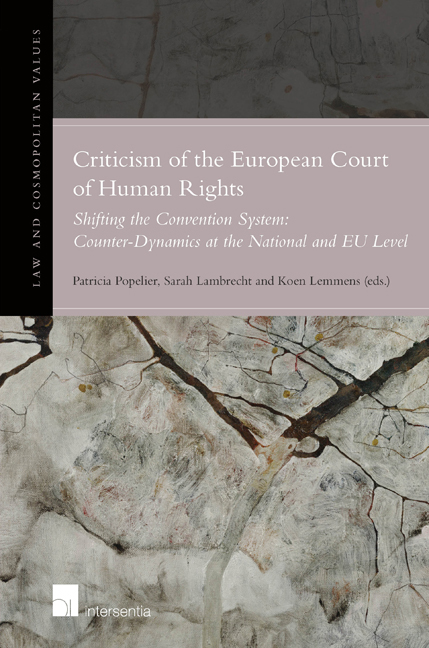 Criticism of the European Court of Human Rights
Criticism of the European Court of Human Rights Book contents
- Frontmatter
- Contents
- List of Abbreviations
- PART I INTRODUCTORY
- PART II SPARSE CRITICISM
- PART III MODERATE CRITICISM
- Chapter 11 France: “Jet'aime, moi non plus”
- Chapter 12 Hungary: ‘Gains and Losses'. Changing the Relationship with the European Court of Human Rights
- Chapter 13 The Netherlands: Political Dynamics, Institutional Robustness
- Chapter 14 Norway: New Constitutionalism, New Counter-Dynamics?
- Chapter 15 Switzerland: The Substitute Constitution in Times of Popular Dissent
- Chapter 16 Turkey: The European Convention on Human Rights as a Tool for Modernisation
- PART IV STRONG CRITICISM
- PART V HOSTILE CRITICISM
- PART VI SYNTHESIS
- APPENDIX
Chapter 12 - Hungary: ‘Gains and Losses'. Changing the Relationship with the European Court of Human Rights
from PART III - MODERATE CRITICISM
Published online by Cambridge University Press: 13 December 2017
- Frontmatter
- Contents
- List of Abbreviations
- PART I INTRODUCTORY
- PART II SPARSE CRITICISM
- PART III MODERATE CRITICISM
- Chapter 11 France: “Jet'aime, moi non plus”
- Chapter 12 Hungary: ‘Gains and Losses'. Changing the Relationship with the European Court of Human Rights
- Chapter 13 The Netherlands: Political Dynamics, Institutional Robustness
- Chapter 14 Norway: New Constitutionalism, New Counter-Dynamics?
- Chapter 15 Switzerland: The Substitute Constitution in Times of Popular Dissent
- Chapter 16 Turkey: The European Convention on Human Rights as a Tool for Modernisation
- PART IV STRONG CRITICISM
- PART V HOSTILE CRITICISM
- PART VI SYNTHESIS
- APPENDIX
Summary
CRITICISM OF THE EUROPEAN COURT OF HUMAN RIGHTS
INTRODUCTION
Hungary was the first country from the post-Communist bloc to join the Council of Europe and ratify the European Convention on Human Rights (hereinafter: Convention or ECHR) in November 1992; this remains a matter of national pride in spite of the growing number of condemnations from Strasbourg. The Convention was promulgated and thus became part of the Hungarian legal system through Act no. XXXIII of 1993 passed in April 1993. There is a broad consensus that joining the Council of Europe and the Convention system marked an important step in the country's striving for the Euro-Atlantic integration, and this position has not changed even if the critical voices about the interpretation followed by the European Court of Human Rights (hereinaft er: ECtHR) have become louder. The Council of Europe is still perceived “as an organisation demonstrating a clear political and ideological stand”, and “there are very few international organisations that have such clear and direct impact on the lives of people and citizens than the European Court of Human Rights”.
The recent constitutional reform has left the status of the Convention in the Hungarian legal system largely untouched. Similarly to the previous Constitution, the new Fundamental Law adheres to a dualist system: while “the generally recognised rules of international law” automatically – by virtue of Article Q (2) – become part of the legal system, treaties, such as the Convention, need to be transposed by an Act of Parliament. The domestic legal order “is rather friendly towards international treaties”. Laws are silent on the hierarchy between the Fundamental Law and international treaties, the former merely postulates that “Hungary shall ensure that Hungarian law be in conformity with international law.” From the Act on the Constitutional Court the supremacy of the Fundamental Law seems to emerge, and duly promulgated international treaties – including the Convention – take precedence over any conflicting regulation.
OUTSIDE POLITICS: GENERAL NEUTRALITY
Since the ratification considerable efforts had been devoted to raising awareness on the Convention and the jurisprudence of the ECtHR among judges, practitioners and public servants.
- Type
- Chapter
- Information
- Criticism of the European Court of Human RightsShifting the Convention System: Counter-dynamics at the National and EU Level, pp. 295 - 326Publisher: IntersentiaPrint publication year: 2016


